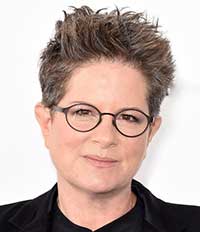Screenwriting MFA

The Screenwriting program challenges students to write well-structured stories inhabited by vivid, compelling characters. The program explores the elements of character, dialogue, scene, setting, texture, style and tone.
The two-year Master of Fine Arts degree program allows students to focus on either feature film or television writing, with opportunities to explore workshops in both areas. Throughout their studies, students are guided by faculty members actively involved in the film, television, and new media sectors, benefiting from their extensive professional experience.
Admission to the Screenwriting program does not guarantee specific workshop placements each term. All workshops and classes require program consent for enrollment.
World-Class Faculty
Requirements
Students build their thesis portfolio by concentrating either on feature film or television writing, though students are encouraged to, and often do take, workshops in both concentrations. The program is designed so that students may fulfill their thesis requirements within their tracks in four quarters, leaving the student space within which to pursue screenwriting workshops outside of their tracks if they wish to do so.
The Screenwriting program has the following time-to-degree requirement: A minimum of six quarters; maximum of seven quarters. The minimum total units required to graduate is 72 units (18 courses). Maintenance of a B average GPA.
COURSES
430: Introduction to Film & Television Writing is required for all MFA screenwriting students and must be taken in the Fall Quarter of the student’s first year. Students must take a minimum of two graduate-level Cinema and Media Studies courses.
Students must also take FT 210 Viewing and Reading Media in the Fall Quarter of their first year, which fulfils the first of two graduate-level Cinema and Media Studies (CMS) courses requirements.
Please see list below for approved course numbers and titles, and please note that not all courses are offered every quarter. Students should consult the Registrar’s schedule for available courses and class times. For courses in the 298 series, students should consult the graduate advisor first to check whether a course fulfills the CMS requirement.
- 203: Film and Other Arts
- 204: Visual Analysis
- 206A: European Film History
- 206B: Selected Topics In American Film History
- 206C: American Film History**
- 207: Experimental Film
- 209A: Documentary Film
- 208B: Classical Film Theory **
- 208C: Contemporary Film Theory
- 209B: Fictional Film
- 209D: Animated Film
- 217: Selected Topics in Television History **
- 217A: American Television History**
- 218: Culture, Media and Society
- 219: Film and Society
- 220: Television and Society
- 221: Film Authors
- 222: Film Genres
- 223: Visual Perception
- 224: Computer Applications for Film Study
- 225: Videogame Theory
- 246: Electronic Culture
- 270: Film Criticism
- 271: Television Criticism
- 276: Non-Western Film
- 277: Narrative Studies
- 298AB: Special Studies (topics vary and must be selected in consultation with the graduate counselor)
Students must take a minimum of one graduate-level FTVDM course outside of screenwriting. These may include classes offered by the Producers Program, Production Program or Animation Program.
Students fulfilling their thesis requirements in the feature film track must take:
- One 434: Advanced Screenwriting Workshop
- One 437: Adaptation for Screen
- One 434B/438: Advanced Screenwriting Workshop — Rewrite
- EITHER an additional 434 or an additional 437
Students fulfilling their thesis requirements in the TV track must take:
- One 434: Advanced Screenwriting Workshop
- Two 284B: One-Hour Drama Pilot Workshops
AND - One 283B: Half-Hour Comedy Pilot Workshop
OR - Two 283B: Half-Hour Comedy Pilot Workshops
AND - One 284B: One-Hour Drama Pilot Workshop

